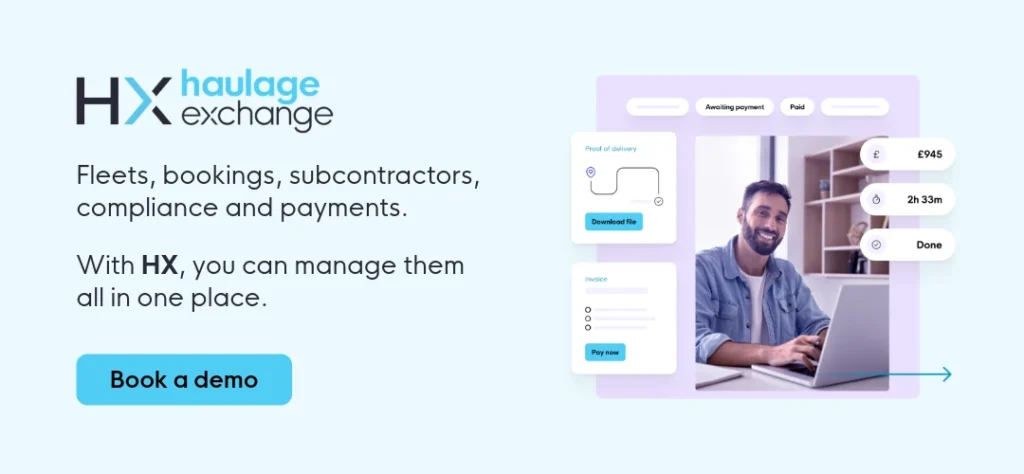Scaling a freight forwarding business is about more than just moving more loads. It requires a strong customer base, solid industry partnerships, and the ability to handle more complex logistics.
Many smaller freight forwarders struggle with inconsistent demand, tight profit margins, and limited access to larger contracts. But with the right approach, it’s possible to expand your operations, take on bigger jobs, and increase long-term revenue.
In this guide, we’ll share practical ways to grow your freight forwarding company in 2025, from attracting more customers to securing larger freight forwarding contracts and improving operational efficiency.
What we’ll cover
How to find more freight forwarding customers
Every growing business needs a steady stream of new clients. Freight forwarders rely on shippers, manufacturers, and retailers to keep work flowing. But with so many logistics providers in the market, standing out can be difficult.
Growing your customer base isn’t just about reaching more businesses—it’s about reaching the right ones.
A focused approach, strong industry connections, and a solid online presence all help attract reliable, long-term clients.
1. Find your unique selling point
Many successful freight forwarders specialise in specific types of cargo or industries.
This approach helps businesses build expertise, attract the right clients, and offer tailored services that stand out from general freight providers.
- Handling specialist freight – Some industries require specific knowledge, such as ADR haulage for hazardous goods or refrigerated transport for perishable items. Specialising in these areas makes it easier to secure long-term contracts.
- Serving specific industries – Retail, automotive, healthcare, and manufacturing all have different logistics needs. Forwarders that understand an industry’s challenges and compliance requirements are more likely to win repeat business.
- Offering regional expertise – Businesses moving goods in and out of particular areas often prefer working with local forwarders who understand the logistics of that region.
A focused approach helps smaller freight forwarders compete with larger companies by offering expertise and personal service rather than just lower rates.
2. Build relationships with local businesses
Working with local manufacturers, wholesalers, and retailers is a practical way to grow.
Many businesses prefer working with freight forwarders in their area, especially for domestic and short-haul transport.
- Approach local manufacturers and suppliers – These businesses often need regular freight transport for raw materials and finished goods. A direct approach—either by phone, email, or visiting in person—can help secure new clients.
- Connect with logistics hubs – Warehouses, distribution centres, and business parks often have companies in need of reliable freight services.
- Partner with regional haulage companies – Working with trusted local carriers makes it easier to take on more jobs and offer flexible transport solutions.
By becoming a go-to provider for businesses in a specific region, freight forwarders can build a steady stream of repeat work.
3. Network at industry events
Face-to-face meetings remain one of the best ways to build trust and win new business. Attending logistics trade shows, freight networking events, and local business meetups can open up valuable opportunities.
- Logistics and supply chain events – Exhibitions like Multimodal UK and industry conferences bring together shippers, hauliers, and forwarders looking for new business connections.
- Business networking groups – Many local and national business groups hold networking sessions where freight forwarders can connect with potential clients.
- Freight marketplaces and industry meetups – Some online freight platforms host in-person events where forwarders can meet shippers and hauliers.
Consistently showing up at these events helps build recognition and credibility within the industry.
4. Leverage LinkedIn for business growth
LinkedIn is a powerful tool for reaching potential customers, building industry connections, and positioning a freight forwarding business as an expert in the field.
A strong LinkedIn strategy can generate leads without relying on paid advertising.
- Optimise your company page and personal profile – A complete LinkedIn page with clear service descriptions, contact details, and regular updates makes a business look more professional. Updating your own LinkedIn profile will also help you get your foot in the door.
- Connect with decision-makers – Reaching out to logistics managers, procurement officers, and supply chain professionals can lead to new business opportunities.
- Share industry insights – Posting updates about logistics trends, case studies, or client success stories builds credibility and keeps a business visible.
- Engage in industry discussions – Commenting on posts, joining logistics groups, and participating in discussions helps raise your freight forwarding business’ profile.
LinkedIn works best when used consistently, so regular activity is important to keep engagement levels high.
5. Get a proper web presence
A professional website helps shippers and suppliers find a business, learn about its services, and get in touch quickly. A well-designed, easy-to-navigate website will help you build trust and improve your credibility as a freight forwarding business.
- Clear service pages – Describing services in detail, including specific areas of expertise like specialist freight forwarding services, helps attract the right customers.
- Customer testimonials and case studies – Showing past success stories reassures potential clients that a forwarder can handle their freight efficiently.
- Easy contact options – A simple contact form, a direct phone number, and a clear call-to-action make it easier for shippers to get in touch.
- SEO and content marketing – Writing blog posts about freight forwarding topics, industry trends, or compliance issues can help attract potential clients through search engines.
A well-maintained website works as a 24/7 marketing tool, helping businesses stand out in a competitive market.
Combine these approaches for the best results
There’s no single way to grow your freight forwarding company. The most successful businesses use a mix of these strategies, balancing in-person networking with a strong online presence.
By focusing on a niche, building relationships with local businesses, attending industry events, using LinkedIn effectively, and maintaining a professional website, freight forwarders can create a strong foundation for growth in 2025 and beyond.
How to keep your customers coming back
Winning new customers is important, but keeping them is what enables real growth. One-off jobs help with cash flow, but long-term freight forwarding contracts create stability, reduce downtime, and allow better financial planning.
Securing repeat business isn’t just about price. Shippers want reliability, clear communication, and a provider that can meet their growing needs.
A structured approach to customer retention helps build a strong client base that supports long-term expansion.
Provide excellent customer service
Shippers expect more than just a service provider—they want a logistics partner they can rely on.
Forwarders that consistently meet expectations and provide exceptional customer service are more likely to secure repeat business and longer contracts.
- Be responsive and proactive – Quick replies to emails and calls, along with proactive updates on shipments, help build trust.
- Handle problems professionally – Issues will arise, but solving them quickly and keeping customers informed can strengthen relationships.
- Be flexible when possible – Last-minute changes and urgent shipments are common in logistics. Forwarders who accommodate these needs are more likely to be chosen for future work.
Good service encourages shippers to stick with a forwarder rather than looking elsewhere.
Communicate clearly and consistently
Regular, clear communication makes freight forwarding contracts run smoothly and keeps customers engaged.
- Set expectations from the start – Clearly outline pricing, service levels, and delivery timeframes to avoid misunderstandings.
- Provide real-time updates – Many shippers expect tracking and status updates, especially for high-value or time-sensitive shipments.
- Schedule regular check-ins – A quick call or email to key clients helps maintain relationships and keeps a forwarder top of mind for future work.
Consistent communication reassures shippers that their freight is in good hands and that they’re working with a reliable provider.
Offer new services to increase revenue
Long-term clients are more likely to use additional services from freight broker or freight forwarder they trust. Expanding service offerings can increase revenue without needing to find new customers.
- Multimodal transport solutions – Offering a mix of road, sea, and air freight can help businesses looking for flexible logistics options.
- Warehousing and distribution – Providing short-term storage or order fulfilment services can add extra value for shippers.
- Specialist freight forwarding services – Expanding into areas like ADR haulage, temperature-controlled transport, or oversized loads can help attract more contract work.
Shippers prefer working with one provider for multiple needs rather than managing multiple contracts with different companies.
Building loyalty with existing clients
Keeping existing customers is easier than winning new ones. Strengthening relationships with long-term clients leads to repeat business and referrals.
- Offer contract incentives – Discounts for long-term agreements or priority booking for repeat customers can encourage loyalty.
- Provide value beyond transport – Sharing industry insights, advising on logistics strategies, or helping clients improve their supply chains builds trust.
- Ask for feedback and act on it – Checking in with customers about their experience and making improvements where needed helps build stronger relationships.
Satisfied customers are more likely to commit to longer contracts and recommend you to others.

Grow your freight forwarding company with subcontractors
At some point, you’ll reach a point where customer demand exceeds your in-house capacity. Whether it’s covering a last-minute job, offering specialist services, or expanding into new routes, subcontracting allows you to grow your freight forwarding company without taking on unnecessary financial risk.
The right subcontractors help forwarders accept more work, improve service levels, and secure larger contracts.
But finding and maintaining reliable partnerships is key to making subcontracting a long-term solution rather than a short-term fix.
How to find the right subcontractors
Not all hauliers and carriers offer the same level of reliability. If you use unvetted subcontractors, you’re at risk of late deliveries, damaged freight, or even contract losses. That’s why working with trusted and experienced partners is so important.
- Use a reputable freight exchange – Platforms like Haulage Exchange provide access to thousands of vetted and insured subcontractors, from courier vans to haulage companies with a variety of lorry sizes, ensuring reliability and fast response times. With instant load-matching, you can secure hauliers for last-minute jobs and guarantee 1-hour pickups anywhere in the UK.
- Look for subcontractors with specialist capabilities – Some of your clients may need dangerous goods moved, refrigerated transport, or oversized load handling. A network of specialists allows you to accept a wider range of contracts without investing in your own fleet.
- Consider a mix of lorry and van sizes – Different loads require different vehicles. A diverse pool of subcontractors means forwarders can handle everything from small pallets to full truckloads without turning work away.
By using a reliable freight exchange, you can quickly find haulage carriers that meet specific requirements, reducing downtime and increasing profitability.
Tips on building strong subcontractor relationships
A good subcontractor isn’t just a backup option—they’re a long-term business partner.
Nurturing these relationships will help you consistently meet demand, improve service levels, and negotiate better rates.
- Prioritise clear communication – Set expectations upfront on pricing, service levels, and response times. Misunderstandings can lead to delays and lost customers.
- Work with subcontractors regularly – The more jobs a subcontractor completes for a you, the better they understand expectations and requirements. This leads to smoother operations and fewer issues.
- Offer fair rates and prompt payments – Reliable hauliers prefer working on freight forwarding contracts from companies who pay on time and treat them as partners, not just service providers. Delayed payments often push subcontractors to take work elsewhere.
- Use a structured performance review – Make sure you monitor the reliability, communication, and overall service quality of your subcontractors. Keeping track of performance ensures that only the best hauliers continue to receive work.
How to scale sustainably with subcontractors
Relying on subcontractors doesn’t mean losing control over your operations. With the right approach, you can grow your freight forwarding company without needing to have your own fleet of vehicles.
- Use technology to manage subcontracted jobs – Load tracking and digital freight management tools help you monitor subcontracted work in real time, improving service consistency.
- Expand into new markets without high overheads – By working with subcontractors in different regions, you can take on freight forwarding contracts beyond your usual service area without needing your own vehicles.
- Prepare for seasonal demand spikes – When volumes increase, having a network of trusted subcontractors ensures that extra work can be handled smoothly without overcommitting resources.
Final thoughts
Growing a freight forwarding company takes careful planning, strong partnerships, and a commitment to reliable service. By focusing on customer relationships, securing stable contracts, and using the right technology, you can scale effectively and take on more freight forwarding contracts without taking on unnecessary risks.
If you’re able to adapt to changing demands and build lasting industry connections, you’ll be well-positioned for long-term success in 2025 and beyond.




